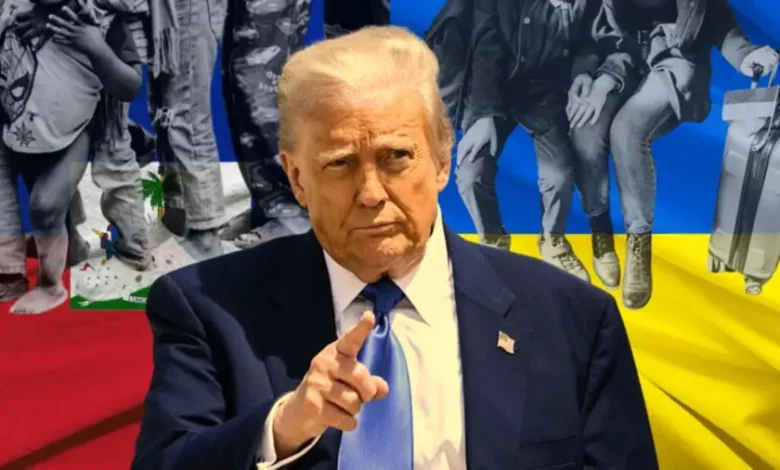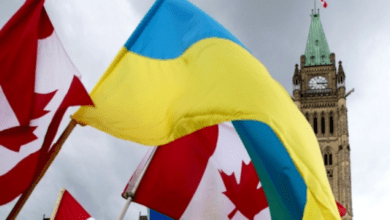Trump intends to encourage voluntary departure of Ukrainian refugees from the US

With the start of Donald Trump’s second presidential term, US immigration policy is undergoing a sharp revision. Already in the first months of his work, his administration has demonstrated a course to curtail protection programs for refugees from war zones, reduce international aid and limit the presence of foreigners in the country. At the heart of this new strategy is an initiative that provides financial incentives for so-called “voluntary deportations,” primarily for those from countries experiencing ongoing war or political instability. Ukrainians who fled Russian aggression after 2022 are also targeted.
What exactly does Washington offer
The Washington Post informs, that the Trump administration has developed a plan to redirect about $250 million in international aid funds to encourage voluntary departures of migrants from the United States. The focus is on approximately 700,000 people, including refugees from Ukraine and Haiti. The move signals a deeper shift from a policy of support and solidarity to a policy of incentivized displacement disguised as “voluntary return.”
The documents seen by The Washington Post indicate that the United States intends to use the money traditionally allocated to foreign aid (in particular, humanitarian support) for an “alternative” program — to pay $1,000 to migrants who agree to leave the country on their own. It is specified that this applies primarily to refugees from conflict zones. Thus, Ukrainians who are in the US under temporary protection programs (for example, TPS or humanitarian password) may face a tough choice: remain under increased control and hostile treatment, or agree to leave for a “reward.”
This program is not just a manifestation of economy or a desire to “bring order” to the migration system. It is a logical continuation of Trump’s general strategy, which involves winding down the activities of the United States Agency for International Development (USAID), winding down most humanitarian missions, and reducing the role of the United States in solving international crises.
Ukrainian refugees: between protection status and return pressure
Ukrainians who fled to the United States after the start of a full-scale war mostly arrived within the framework of temporary humanitarian programs, in particular through the Uniting for Ukraine mechanism. These people do not have a classic refugee status or a permanent residence permit. Their presence in the US depends on the political will of the administration. They are not full-fledged immigrants, but only recipients of temporary protection, a mechanism that has more than once become a victim of political decisions.
The offer of $1,000 in exchange for voluntary departure is not just an economic calculation. This is a political message: the new administration does not consider the presence of these people in the United States justified. Such a policy also leaves no room for long-term planning, in particular for the integration of children in schools, training, employment or business creation. In fact, it is an attempt to displace hundreds of thousands of people who did not have time or did not have the opportunity to submit documents for other forms of legalization.
Bypassing the UN and international obligations
One of the most telling features of the new initiative is an attempt to bypass the International Organization for Migration (IOM), the body that traditionally coordinates the process of voluntary return of migrants and monitors the observance of human rights during such procedures. The IOM is not mentioned as a partner in Trump’s plans, and this shows Washington’s desire to act around international standards.
It is also a signal to the rest of the world: the US is no longer ready to participate in global systems for the protection of migrants, particularly from countries where the US itself was one of the guarantors of stability. Ironically, Ukraine is one such country: American support was key in resisting Russian aggression. Trump’s current course actually nullifies the moral obligation that the US has repeatedly declared at the international level.
Political and humanitarian context
The program to stimulate the voluntary departure of Ukrainians is taking place against the background of the gradual curtailment of American aid to Kyiv. The idea that it is possible to cut funding for war and humanitarian support while “unburdening” the domestic system by expelling foreigners is a pragmatic but cynical formula that seems particularly harsh in the context of an ongoing war.
The mass return of Ukrainians to a destroyed country without guarantees of safety, work, and housing is not just repatriation. This could become a humanitarian catastrophe, a new crisis to which international organizations will no longer respond — precisely because of the broken cooperation with the UN and USAID.
What does this mean for Ukrainians in the USA
Ukrainians who have found themselves under protection in the USA should carefully monitor all changes in the policy of immigration authorities. New challenges are emerging: decreasing chances of continuation of humanitarian password programs, more complicated work permit procedures, pressure to end social support. The idea of ”voluntary” departure, although accompanied by a monetary offer, is primarily a political decision, behind the purposeful curtailment of protections for those who have lost their homes due to war.
It is necessary to prepare for changes, look for alternative ways of legalization, obtaining refugee status, applying for asylum, applying for permanent residence on other grounds. The risks that after 2025 the US will turn from a country of protection to a country of displacement are no longer assumptions, but a real scenario.
The Trump administration’s initiative to finance the “voluntary” return of Ukrainians and Haitians demonstrates not only the harshness of the new US immigration policy, but also the deep gap between declarative support for Ukraine and the actual willingness to care for Ukrainians on American soil. Those who escaped the war face a new challenge: will they be able to stay in the United States when the state itself offers money to leave? And will they have enough strength, information and legal mechanisms to stay – not by compulsion, but by law?





